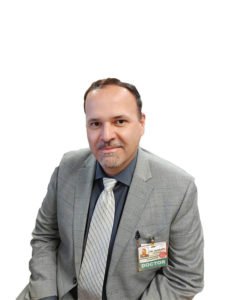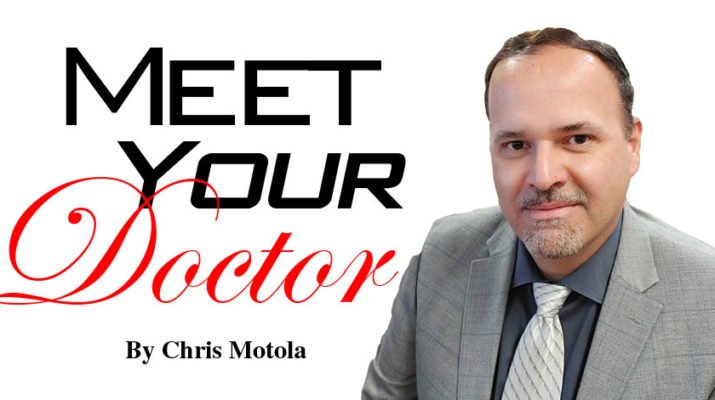Started as resident and rose to the position of top doctor at St. Joseph’s Health. The Brooklyn native discusses his goals and why he chose to stay in Syracuse
By Chris Motola

Q: You’ve been with St. Joe’s for a long time. How did you work your way up the ladder?
A: I started with St. Joseph’s as a resident. I really liked it here. Being from New York City, I had assumed that I was eventually going to return there, but the culture here, which I really enjoyed, made it hard to want to pack up and go home. I really enjoyed being here. I ended up joining the hospitalist team here in 2006 as an attending [physician]. Worked as a full-time hospitalist for several years. I was asked to be a coordinating member of the team. I was the assistant medical director for about two years. Shortly after that I was asked to be chief of hospitalist services, overseeing both teams in the hospital and some of our regional programs. I did that for about five years, and was recently asked to step into the role of vice president of medical affairs.
Q: Is your position entirely administrative?
A: The position is mostly administrative, I’d say about 80% administrative, 20% clinical. Mainly because I do want to keep my clinical skills sharp. I’m not quite ready to give that part up. Plus, I think being clinical and visible on the floor keeps you in touch with the medical staff and a little more down to earth. So I don’t want to lose that part, for sure.
Q: One of your main goals is to shorten hospital stays, correct?
A: It’s a little complex because certainly I want to help us not just reach the efficiencies we need in today’s healthcare climate. And, of course, a big portion of that is decreasing the cost in care to the patient. But really more importantly it’s transforming the care that occurs in the hospital to be more patient-centric. When a patient stays longer than they should, they are at risk of picking up infections or ending up severely deconditioned from not moving around. I think it’s a big patient quality and satisfaction issue. I think if you improve the quality of care, then the finances will fall into place and length of stay will decrease as well.
Q: How can you reduce the deconditioning problem?
A: When you’re ill, you feel wiped out and tired, and it’s good to let someone rest for a little bit. But once you start recovering from an acute illness, it’s really important to get mobile again. It improves your immune system. It keeps your lungs open. It keeps you from deconditioning further, which can actually make you sicker. So, mobility is a really key issue past the acute care phase of their treatment. We do focus on keeping people as mobile as possible. We have physical therapists for those who need a little bit more intervention if they can’t fully get out of bed, to help them regain some of the strength they lost during that acute illness. The more you incorporate that into your care, the better the patient does and the shorter the hospital stay usually is.
Q: There’s been a big push toward using outpatient care where possible over the last decade or two. What role does inpatient care pay in that environment?
A: The inpatient care setting has changed drastically since I started practicing, and I hear from my more mature colleagues that it’s changed even more drastically since they started. The focus over the years has really been to take care of the patient at home and in the community whenever possible. And even in the case of inpatient care, we’re trying to get the patient home and back into the community as soon as possible.
Q: St. Joe’s has a well-known reputation for cardiac care. What’s another area in which St. Joe’s could reach that level of care with a little effort?
A: I would say our ENT [ear, nose and throat] program is something we’ve been ramping up over the years. We’ve hired some ENT specialists practicing at our outpatient centers and some care at the hospital as well. I think we still have some opportunity there to serve our patients with expanded ENT services. In addition, over the last couple years, we’ve become a designated stroke center. It’s taken off very well, but there are still opportunities there as well. It’s a tougher market in this town, because we aren’t the only designated stroke center.
Q: Cities like Syracuse have put a lot of effort into developing their medical industries. Coming from New York City, do you see smaller cities able to offer a similar level of care these days?
A: I’m actually very impressed with the level of care we’re able to provide here in Central New York. Of course, cities like Boston and New York have big academic centers that we might lack here, but if you compare our cardiology and cardiac surgery and grades, the care you can receive here is sometimes even better than you can receive in those regions. We are able to attract some pretty talented physicians.
Q: Beyond shortening hospital stays, what kind of impression do you want to leave on St. Joe’s?
A: Just to reiterate, I get the sense that patients are more informed about the care they receive, just like any other product. So, I want to play a central role in making care more patient-focused. I also want to be a vote for the medical staff, who see drastic changes happening all around them. We need to keep them in mind as we’re making changes to the health care industry.
Lifelines:
Name: Cristian Andrade, M.D.
Position: Vice president of medical affairs at St. Joseph’s Medical Center
Hometown: Brooklyn
Education: University of Medicine and Dentistry of New Jersey in Newark; Wagner College, Staten Island; Advanced Executive Leadership for Physicians, Cornell University-HANYS
Affiliations: St. Joseph’s Medical Center; Oneida Healthcare; Rome Memorial Hospital; Bishop Rehabilitation and Nursing Center
Organizations: Society of Hospital Medicine
Family: Married, four children
Hobbies: Fishing, maintaining salt water aquariums, outdoor activities
In the News
Physician Cristian Andrade has recently been appointed St. Joseph’s Health’s new vice president of medical affairs (VPMA). Andrade has been with St. Joseph’s for 16 years. Family medicine-trained, he joined St. Joseph’s as a resident in 2003 and has served as a St. Joseph’s hospitalist since 2006. During that time, Andrade has assumed progressive administrative responsibilities, most recently as the regional medical director and chief of hospitalist services.

